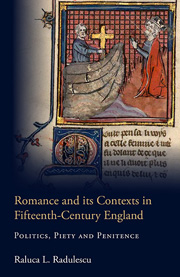Book contents
- Frontmatter
- Dedication
- Contents
- Acknowledgements
- Abbreviations
- Preface
- 1 Fifteenth-Century Contexts for the Reading of Middle English Romances
- 2 Spiritual Journeys through Political Realities: the ‘Pious’ Romances
- 3 Chronicling Britain's Christian Conversion: Henry Lovelich's History of the Holy Grail
- 4 The Politics of Salvation in Thomas Malory's Le Morte Darthur
- Afterword
- Appendix 1 Plot summaries
- Appendix 2 Genealogies
- Bibliography
- Index
Afterword
Published online by Cambridge University Press: 05 October 2013
- Frontmatter
- Dedication
- Contents
- Acknowledgements
- Abbreviations
- Preface
- 1 Fifteenth-Century Contexts for the Reading of Middle English Romances
- 2 Spiritual Journeys through Political Realities: the ‘Pious’ Romances
- 3 Chronicling Britain's Christian Conversion: Henry Lovelich's History of the Holy Grail
- 4 The Politics of Salvation in Thomas Malory's Le Morte Darthur
- Afterword
- Appendix 1 Plot summaries
- Appendix 2 Genealogies
- Bibliography
- Index
Summary
The richness and diversity of the material explored in this study can only do partial justice to the complexity of the forms in which the two thematic strands of the king's suffering and concerns over lineages were expressed from the end of the fourteenth century and throughout the fifteenth in England. Both themes emerge naturally from the material itself: first in the transmission of the pious romance Robert, then in striking linguistic parallels between the vocabulary employed in all three romances (Gowther, Isumbras and Robert), on the one hand, and the political propaganda produced for the houses of Lancaster and York, on the other. The broad chronological sweep of the extant manuscripts, as well as their continuing endurance in the print era, attest to the continuous popularity of these romances with audiences in these periods.
Political readings of the male-centred romances can only be envisaged if previous labels, thematic (‘family romance’, ‘exemplum’) or genre-based (‘hagiographical romance’), to mention just a few, are (temporarily, at least) put aside, and a broader, yet also deeper, consideration of the cultural context in which these romances circulated is undertaken. Not all extant manuscript versions of the pious romances considered in this study would have necessarily been interpreted in a political way and neither would their political interpretation be of the same intensity or depth at all points of crisis in the period. On the other hand, the involvement of the upper peasantry and artisans alongside the middle classes in the political debates of the day shows that all of these romance audiences brought to their reception of these texts more diverse concerns than previously identified educational, devotional and leisure-oriented interests.
- Type
- Chapter
- Information
- Romance and its Contexts in Fifteenth-Century EnglandPolitics, Piety and Penitence, pp. 198 - 200Publisher: Boydell & BrewerPrint publication year: 2013



